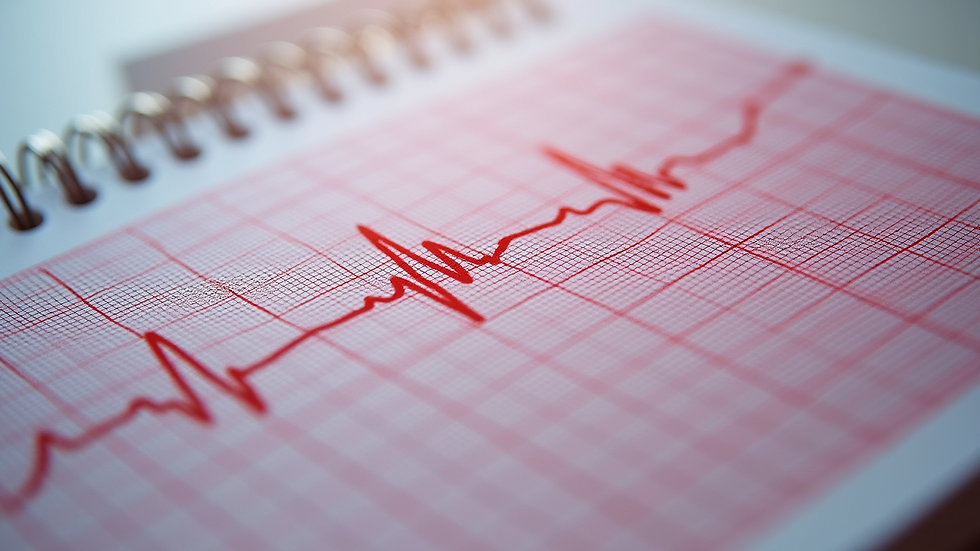Understanding the Role of an Electrocardiogram in Heart Health
- Rustams Bobonazarovs

- Sep 9, 2025
- 4 min read
The heart is one of the most vital organs in the human body. Monitoring its health is crucial for preventing and managing cardiovascular diseases. One of the most common and effective tools used by healthcare professionals to assess heart function is the electrocardiogram, often abbreviated as ECG. This simple, non-invasive test provides valuable insights into the electrical activity of the heart, helping detect abnormalities early and guide treatment decisions.
How an ECG Supports Heart Health
An ECG records the electrical signals generated by the heart as it beats. These signals control the heart's rhythm and rate, ensuring blood is pumped efficiently throughout the body. When the heart's electrical system is disrupted, it can lead to arrhythmias, heart attacks, or other serious conditions.
By performing an ECG, doctors can:
Detect irregular heart rhythms such as atrial fibrillation or ventricular tachycardia.
Identify previous or ongoing heart attacks by spotting characteristic changes in the ECG pattern.
Monitor the effects of medications on the heart.
Evaluate symptoms like chest pain, dizziness, or palpitations.
Assess heart health before surgery or during routine check-ups.
The test is quick, painless, and requires no special preparation. Electrodes are placed on the chest, arms, and legs to capture the heart's electrical signals, which are then displayed as waves on a monitor or printed on paper.

Close-up view of ECG machine displaying heart rhythm
The Process of Getting an ECG for Heart Health
When you visit a clinic or hospital for an ECG, the procedure usually takes about 5 to 10 minutes. Here is what to expect:
Preparation: You will be asked to remove any clothing or jewellery that might interfere with electrode placement.
Electrode placement: Small sticky pads with wires (electrodes) are attached to specific points on your chest, arms, and legs.
Recording: The machine records the electrical activity of your heart while you lie still and breathe normally.
Analysis: A healthcare professional reviews the ECG tracing to identify any abnormalities.
It is important to stay relaxed and still during the test to avoid interference with the readings. The results are usually available immediately and can be discussed with your doctor during the same visit.

Eye-level view of patient lying on examination table during ECG test
What's the difference between an ECG and an electrocardiogram?
Many people wonder if there is a difference between an ECG and an electrocardiogram. In fact, they are the same thing. "ECG" is simply the abbreviation of "electrocardiogram." Both terms refer to the test that records the electrical activity of the heart.
The abbreviation ECG is more commonly used in medical settings and everyday conversation because it is shorter and easier to say. However, when reading medical literature or official documents, you might see the full term electrocardiogram.
Understanding this terminology helps avoid confusion when discussing heart health with healthcare providers or reading about cardiac tests.
Common Conditions Diagnosed with an ECG
An ECG can reveal a variety of heart conditions, some of which may not show obvious symptoms. Here are some examples:
Arrhythmias: Irregular heartbeats such as atrial fibrillation, which can increase the risk of stroke.
Myocardial infarction (heart attack): Changes in the ECG can indicate damage to the heart muscle.
Ischaemia: Reduced blood flow to the heart, often due to blocked arteries.
Heart enlargement: Conditions like hypertrophy can be detected by changes in the ECG waveforms.
Electrolyte imbalances: Abnormal levels of potassium or calcium affect the heart's electrical activity.
Early detection through an ECG allows for timely treatment, which can prevent complications and improve quality of life.

High angle view of ECG printout showing heart waveforms
When Should You Consider Having an ECG?
You might wonder when it is appropriate to have an ECG. Here are some situations where an ECG is recommended:
Experiencing symptoms such as chest pain, shortness of breath, dizziness, or palpitations.
Having a family history of heart disease.
Undergoing a routine health check-up, especially if you have risk factors like high blood pressure, diabetes, or high cholesterol.
Before starting a new exercise program or physical activity.
Monitoring the effects of heart medications or pacemakers.
Following up after a heart attack or cardiac surgery.
If you have concerns about your heart health, speak to your healthcare provider about whether an ECG is right for you. Many clinics offer quick and convenient testing services.
For those interested in learning more or booking a test, an electrocardiogram ecg can be arranged easily through specialised providers.
Taking Care of Your Heart Beyond the ECG
While an ECG is a valuable diagnostic tool, maintaining heart health requires a comprehensive approach. Here are some practical tips:
Adopt a heart-healthy diet rich in fruits, vegetables, whole grains, and lean proteins.
Exercise regularly to improve cardiovascular fitness.
Avoid smoking and limit alcohol consumption.
Manage stress through relaxation techniques or counselling.
Keep chronic conditions under control, such as diabetes and hypertension.
Attend regular medical check-ups to monitor your heart and overall health.
By combining lifestyle changes with regular medical assessments, you can significantly reduce your risk of heart disease.
Understanding the role of an ECG for heart health empowers you to take proactive steps in monitoring and protecting your heart. This simple test provides critical information that can save lives and improve wellbeing. If you experience any symptoms or have risk factors, consider discussing an ECG with your healthcare provider today.


